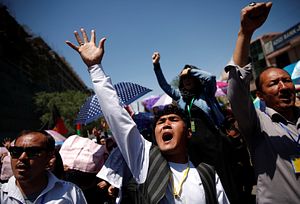On May 16, Kabul witnessed a peaceful protest, by a group known as #TheLightingMovement for justice in #TheGreatMonday. Thousands of people, the majority from the Hazara community demanded their share in Afghanistan’s 20-year energy master plan.
The movement began after the Afghan cabinet sanctioned a 500 KW project via Salang Pass. This was contrary to the recommendation of a report from Fichtner, the German engineering company that commissioned the master plan and opted for the Pul-e-Khumri-Bamyan-Wardak route for the transmission line from Turkmenistan to Afghanistan. The government had prevailed on Fichtner to reroute the transmission via Salang Pass, bypassing Bamyan. The May 16 protesters were calling on the government to run the line through Bamyan province; however, Afghan President Ashraf Ghani continues to resist the idea.
Protests involving the Afghan diaspora have continued in other countries. The movement has threatened that it will gather thousands of protesters in Brussels where the International Conference for Afghanistan will be held in November 2016 if the government continues to ignore their demands.
This movement has created a new political trend – one that has not previously existed in Afghanistan. The country has never seen a popular movement form for an economic cause – the constitutional monarchy movement of the 1960s and the communist movements of 1970s-1980s were driven by ideology. The currently movement has triggered a new discourse for social justice in Afghanistan, one that until recently would have seemed outlandish.
Since the start of the modern state, Afghan citizens have not been treated equally. For one thing, there has been a racial hierarchy in which the Pashtuns have enjoyed the exclusive right to rule the country, the Tajiks run the bureaucracy, while the Uzbeks and the Hazaras form the bottom social stratum.
This was not always the case. The breakdown of the government of President Mohammed Dauod Khan in 1978 marked the end of total Pashtun dominance. All four communist presidents were Pashtun, but their cabinets included members of other ethnic communities. The 1990s marked the end of central power, and the power vacuum that was created ethnic minorities the opportunity to further their self-determination and claims for equal rights.
This ethnic self-determination struggle is associated with the civil wars of 1990s, which was fought among factions belonging to Afghanistan’s major ethnic groups. Although these conflicts exacted an enormous social and economic price, they did inject a social justice discourse into the Afghan political tradition, as reflected in the 2004 Constitution. It was in the shadow and influence of the civil wars that the new constitution acknowledged the equality of Afghan citizens for the first time.
The most outspoken proponent for social justice Afghanistan was Abdul Ali Mazari, the Hazara leader and founder of Hezb–e-Wadat, the first Hazara political party. However, his claims were not welcomed by the mujahideen government, which led to the Kabul civil wars. Mazari called for proportional ethnic representation in the government; in one speech he said, “I claim the rights of the ethnic groups, as brothers, but equal…each ethnicity should be represented in the government based on their population.” Mazari also called for elections and democratic governance. “The people should choose their own destiny through elections…other leaders think elections are anti-Islamic, and I am surprised at that. Aren’t we living in the 20th century?” The leader of Hezb-e-Wahdat pushed for electoral constituencies to be redistricted for more equitable population distributions.
Mazari also spoke for women’s rights. As a member of the clergy himself, he drew on religion. “Islam is the religion of reason, how then can they claim that women do not have rights… It’s not fair to say that half of society has no rights at all, it’s un-Islamic.” Mazari was aware of women’s rights and the growing political role of women in other countries. “Its illogical, in the 20th century, when women in other countries are elected as presidents, prime ministers and army chiefs, for our country to tell them that they do not have any rights at all.”
He also propounded the egalitarianism principle, in which all citizens are equal beneficiaries of the state and its economic policies. “We don’t want any privilege and will not give any privilege to anybody, this is our stance and we don’t want war for this either.” Hezb-e-Wahdat proposed drastic changes in the political institutions and practices of Afghanistan, to make them sensitive to democratic values and ethnic inclusiveness.
In its concept, #TheLightingMovement is heavily influenced by the discourse that Mazari initiated. Most proponents of the movement come from the Hazara community and agree with Mazari’s dreams for Afghanistan. This movement has adopted peaceful protests as its method for pressing its claims; the government of Afghanistan should reward this by recognizing their claims. Ghani can set an example that encourages armed groups, including the Taliban, to change their approach and adopt peaceful methods of pushing their claims. This is an opportunity that has come at great cost, and it may not come again.
Rustam Ali Seerat is an International Relations graduate student from South Asian University, New Delhi.

































